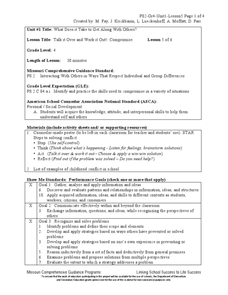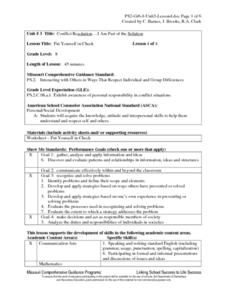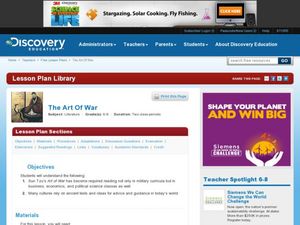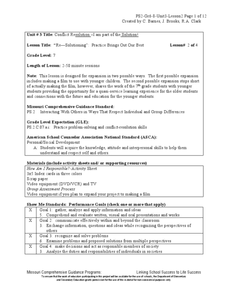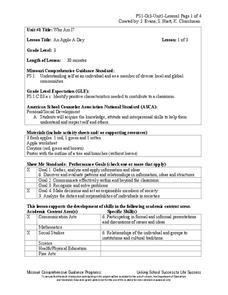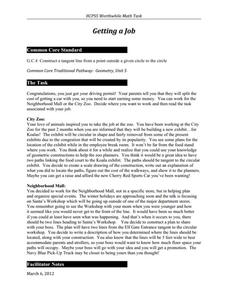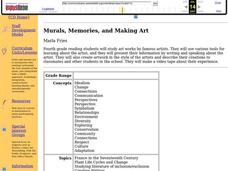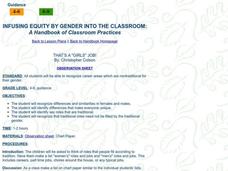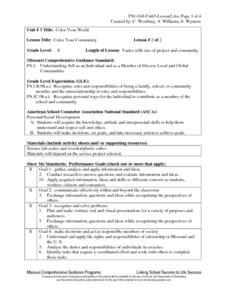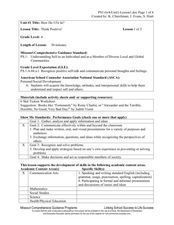Curated OER
Respect: Looks Like, Sounds Like, Feels Like
Sixth graders participate in a question and answer discussion on respect and then complete the "Planning to Use Respect" activity sheet. They describe the senses of a stuffed animal to their peers and assess how respect looks, sounds and...
Curated OER
What Does Respect Look Like in School?
Fourth graders discuss why everyone needs and wants to feel respected. As a class, they share what respect looks like and what disrespect looks like. They pretend they have to leave their most valued object with a secret agent and what...
Curated OER
How Does a Friend Act?
Students brainstorm a list of characteristics that friends should and should not have. In groups, they are given a set of hand puppets in which they role-play different scenerios in front of the class. To end the instructional activity,...
Curated OER
Bursting Stereotypes
Ninth graders discuss the importance of respecting others. After popping balloons, they use paper strips to write words representing stereotypes for men and women. In groups, they share their list and identify those that could be used...
Curated OER
Talk it Over and Work it Out!: Compromise
Fourth graders explore, analyze and discuss how to interact with others in ways that respect individual and group differences. They identify and practice the skills used to compromise in a variety of situations. Each students studies the...
Curated OER
Put Yourself in Check
Eighth graders identify what it means to utilize and accept personal responsibility in relationships with others and why it is important to have a self-awareness during conflict. They also role play spontaneously a common conflict among...
Curated OER
The Learning Book
First graders identify, comprehend, and evaluate the content and artistic aspects of oral and visual presentations. Then they participate in formal and informal presentations and discussions of issues and ideas. Students also create...
Curated OER
The Clique
Ninth graders identify and demonstrate the ability to use interpersonal skills needed to maintain quality relationships. Then they identify personal responsibility in conflict situations, while continuing to apply problem-solving and...
Curated OER
ADULT ESOL LESSON PLAN--Family and Parenting
Students, after reviewing a vocabulary list on the board, examine how to properly take care of children (requirement for food, shelter, hygiene, childcare providers, etc.). In addition, the legal side of taking care of children and their...
Curated OER
The Art Of War
Students analyze the military, business, and political implications of Sun Tzu's book The Art of War. In this literature lesson, students read and discuss the novel prior to interviewing business people about business practices that...
Curated OER
Goldilocks Revisited
Second graders investigate the story of "The Three Bears" while focusing on the character of Goldilocks. They answer key questions that are focused upon the development of positive feelings and reactions. Students discuss the possible...
Curated OER
"Re-Solutioning": Practice Brings Out Our Best
Seventh graders write scripts for scenarios to be "re-solutioned". One re-solution scenario will be role played for whole class. They also identify what personal responsibility means and who is responsible in taking personal...
Curated OER
Are You Balanced?
Fifth graders discuss what it means to have balance in their lives. Individually, they are given a worksheet in which they list their activities and things they are involved in. To end the lesson, they place weights on each side of a...
Facing History and Ourselves
What Shapes Your Identity?
Sixth graders explore their individual identities. In this personal identity lesson, 6th graders write biopoems using the provided template. Students share their poems and respond to the poetry shared.
Curated OER
An Apple A Day
Third graders brainstorm a list of how they can tell if someone feels bad about themselves. As a class, they describe three different apples shown to them. Individually, they cut out shapes of apples and color them to place them on a...
Curated OER
Getting a Job!
Twelfth graders are given the tools to create a presentation about a career of interest to them. Individually, they develop a multi-media presentation about their career and the education needed to obtain it. To end the lesson, they...
Curated OER
Murals, Memories, and Making Art
Fourth grade reading students study art works by famous artists. They use various tools for learning about the artist, and they present their information by writing and speaking about the artist. They also create artwork in the style of...
Curated OER
A Peaceful Classroom
Students complete activities to analyze and create a peaceful environment. In this peaceful living lesson, students read about Sadako and how she is associated with peace. Students practice making paper cranes, discuss their beliefs...
Curated OER
Text Complexity in the Common Core
Use these tools to choose a text that is appropriate and challenging, while also fulfilling the Common Core’s requirement for text complexity.
Curated OER
THAT'S A "GIRLS" JOB!
Young scholars identify the differences in males and females and examine how sex roles are traditional.
Curated OER
Color Your Destiny
Eighth graders read and discuss a variety of children's books that deal with feelings, self-concept and how they affect a person's perceptions of themselves as well as their world. They also tie in interrelationships of visual and...
Curated OER
Color Your Community
Eighth graders identify the self as an individual and as a member of a diverse local and global community. They recognize roles and responsibilities of being a family, school, or community member and the interrelationship of roles and...
Curated OER
Getting Caught In The Web
Sixth graders brainstorm the ways a person's actions can affect a community. As a class, one classmate is given a ball of yarn and pass it along to another student creating a web. Next, some classmates are asked to drop their part and...
Curated OER
Think Positive!
Fourth graders are read a story in which they identify the positive and negative thinking. In groups, they are given a scenerio in which they change the negatives into a positive. They perform the scenerio to tthe class and discuss how...






